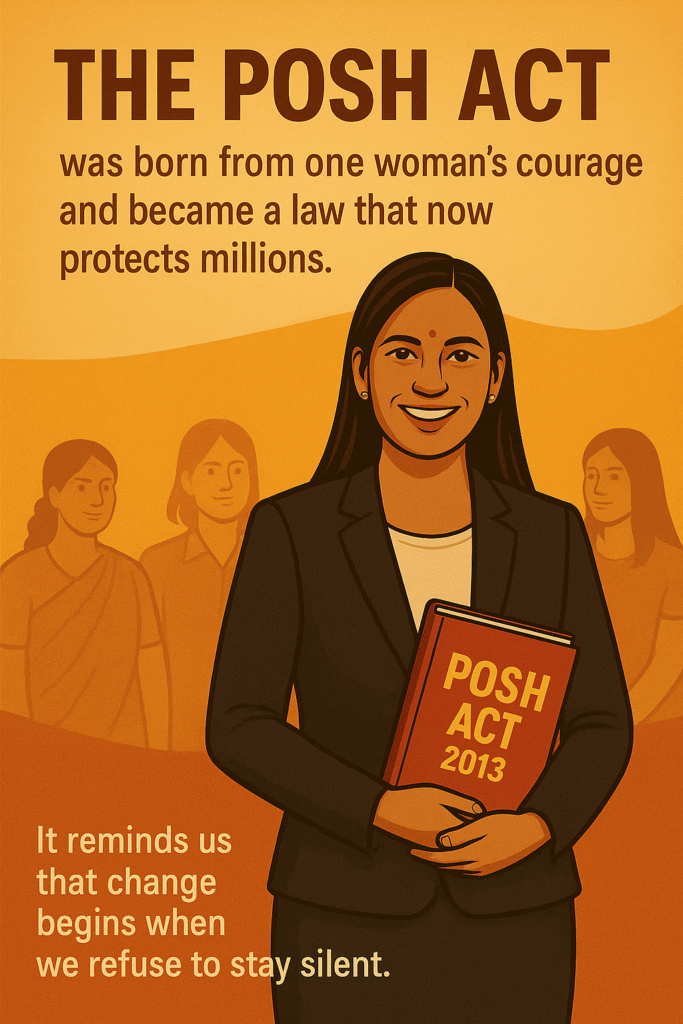Born from Courage, Built on Equality: From an Incident That Changed India to a Law That Protects Every Working Woman
The POSH Act That Protects Every Working Woman. There was a time when women at workplace had to quietly face uncomfortable situations, unfair behaviour, or even harassment, because there was no specific law to protect them. This changed completely after one strong woman, Bhanwari Devi, decided to raise her voice.
In 1992, Bhanwari Devi, a social worker from Rajasthan, tried to stop a child marriage in her village. She was harassed and assaulted for doing her duty. Her courage to seek justice reached the Supreme Court, and from her case came the foundation of the law that now protects every working woman in India. Born from Courage, Built on Equality

The Beginning—Vishaka Guidelines

In 1997, the Supreme Court gave a historic judgment in Vishaka vs. State of Rajasthan. This judgment introduced what we call the Vishaka Guidelines, which for the first time defined sexual harassment at the workplace and gave directions to all employers to:
- Creating a safe and respectful workplace goes beyond legal compliance — it is about building a culture rooted in trust, empathy, and equality. A positive work environment ensures that every employee, regardless of gender, role, or background, feels valued, heard, and secure. Respect at the workplace begins with clear communication, defined boundaries, and sensitivity toward the feelings and dignity of others. Organizations must implement fair policies, conduct regular awareness sessions, and lead by example through ethical behaviour at all levels of management. A truly safe workplace discourages gossip, bias, and any form of discrimination, while encouraging open dialogue and early reporting of grievances without fear of retaliation. When safety and respect become part of the company’s daily culture, employees perform with confidence, collaboration strengthens, and the workplace transforms into a space where professionalism and human dignity coexist. Born from Courage, Built on Equality
- Forming a committee to handle complaints is one of the most crucial steps under the POSH Act, 2013 to ensure fair and confidential redressal of workplace grievances. Every organization with ten or more employees must constitute an Internal Complaints Committee (ICC) at each branch or office. The committee should include a senior woman employee as the Presiding Officer, at least two members familiar with gender issues or legal matters, and one External Member from outside the organization to ensure impartiality. This diverse composition helps maintain balance, transparency, and trust in the inquiry process. The ICC is responsible for receiving, investigating, and resolving complaints of sexual harassment in a time-bound and sensitive manner while maintaining complete confidentiality. A well-trained and proactive committee not only ensures legal compliance but also reinforces the organization’s commitment to employee welfare, equality, and respect at the workplace. Born from Courage, Built on Equality
- Taking prompt and fair action when any incident occurs is vital to maintaining trust and credibility within an organization. Under the POSH Act, 2013, once a complaint of sexual harassment is received, the Internal Complaints Committee (ICC) must act swiftly, ensuring that the process is handled with confidentiality, empathy, and neutrality. Immediate steps include acknowledging the complaint, providing support to the aggrieved person, and initiating an unbiased inquiry without unnecessary delay. Both the complainant and the respondent must be given an equal opportunity to present their side, and all evidence or witness statements should be carefully documented. Delayed or biased actions can erode employee confidence and expose the organization to legal and reputational risks. Fair and timely redressal demonstrates that the company values integrity, protects its people, and treats all complaints with seriousness and respect—reinforcing a culture of accountability and zero tolerance for misconduct. Born from Courage, Built on Equality
The Vishaka Guidelines of 1997 marked a turning point in India’s legal and social approach to workplace equality and women’s safety. Issued by the Supreme Court in the landmark case Vishaka vs. State of Rajasthan, these guidelines were the first formal recognition that sexual harassment at the workplace is a violation of a woman’s fundamental rights under the Constitution. They required every employer to create a safe working environment, establish a complaints committee, and adopt preventive and disciplinary measures. Although these directions did not have the status of a law, they served as a powerful framework that filled the legal vacuum for more than a decade. The Vishaka Guidelines laid the foundation for awareness and accountability across organizations, gradually shaping public discourse and influencing policymakers. Ultimately, these principles evolved into a comprehensive statute, the Sexual Harassment of Women at Workplace (Prevention, Prohibition and Redressal) Act, 2013, giving legal force to what began as judicial guidance.
When the POSH Act Became Law
After years of demand from women’s groups and activists, the Indian Parliament passed a dedicated law in 2013 called the Sexual Harassment of Women at Workplace (Prevention, Prohibition and Redressal) Act, 2013, or simply, the POSH Act.
This law came into force on 9th December 2013, and from that day, every organization with 10 or more employees must:
- Every organization with ten or more employees is legally required under the POSH Act, 2013 to form an Internal Complaints Committee (ICC). The ICC serves as the primary body to address and resolve complaints of sexual harassment at the workplace. It must include a senior woman employee as the Presiding Officer, two or more members with experience in social work or legal knowledge, and one External Member from outside the organization to ensure fairness and impartiality. This committee is responsible for receiving complaints, conducting inquiries, maintaining confidentiality, and recommending suitable action within defined timelines. A properly constituted and trained ICC not only ensures compliance with the law but also builds trust, safety, and accountability within the organization
- Appointing an External ICC Member is a mandatory requirement under the POSH Act, 2013 to ensure fairness and neutrality in handling sexual harassment complaints. The external member must be someone from outside the organization—typically a legal professional, social worker, or person experienced in issues of gender justice or women’s rights. Their independent perspective helps prevent internal bias, ensures that inquiries are conducted objectively, and that the rights of both parties are protected. The presence of an external member also enhances the credibility and transparency of the Internal Complaints Committee (ICC), reassuring employees that complaints will be handled ethically, confidentially, and without prejudice.
- Conducting regular awareness and sensitization trainings is an essential part of an organization’s duty under the POSH Act, 2013. These sessions help employees understand what constitutes sexual harassment, acceptable workplace behaviour, and the process of raising complaints safely. Training should be conducted for all levels — from management to floor staff — in a language and format they understand. It should also guide the Internal Complaints Committee (ICC) on proper procedures for inquiry and redressal. Regular awareness programs not only ensure legal compliance but also foster a culture of respect, inclusivity, and accountability, where employees feel confident to speak up and workplaces remain safe and professional
- Under the POSH Act, 2013, employers and the ICC must maintain proper records of every case—complaints received, notices issued, statements/evidence, inquiry minutes, recommendations, employer’s action taken, trainings conducted, and ICC constitution—securely for at least three years. At the end of each year, the ICC must prepare an Annual Report stating the number of complaints received, disposed of, pending, and awareness programmes held, along with any recommendations. This report must be submitted to the District Officer (as notified by the State) and shared with the employer for internal compliance; companies typically also disclose POSH compliance in their Board/HR report. Timely, accurate reporting demonstrates diligence, preserves confidentiality, and helps avoid penalties for non-compliance. …………….Born from Courage, Built on Equality
This made workplace safety not just a good practice but a legal responsibility for every employer.
Why the POSH Act Matters
The POSH Act, 2013 is not just a piece of legislation—it represents a major step toward achieving equality, dignity, and respect in every workplace. It goes beyond punishing offenders and focuses on creating an environment where inappropriate behaviour is prevented through awareness and accountability. The law encourages organizations to develop a culture of respect, fairness, and inclusion by training employees on appropriate workplace conduct and their rights and responsibilities. It ensures that both men and women understand that professional spaces must be free from fear, bias, and harassment. Through mechanisms like the Internal Complaints Committee (ICC), awareness sessions, and transparent policies, the Act empowers employees to speak up and reinforces the employer’s duty to maintain a safe, ethical, and gender-sensitive workplace. Ultimately, the POSH Act helps transform compliance into culture—making respect the foundation of every professional relationship. ……..Born from Courage, Built on Equality
The law empowers women to speak up, helps companies prevent harassment before it happens, and builds a culture where professionalism and respect go hand in hand.
The POSH Act was born from one woman’s courage and became a law that now protects millions. It reminds us that change begins when we refuse to stay silent.
Every workplace, whether an office, factory, school, or college, has a duty to ensure safety and respect for all.

Why Choose Us
At Legistralaw, we don’t just conduct trainings — we help organizations build safer and more respectful workplaces.
Led by Adv. Dhanwanti Rai, a Supreme Court Lawyer and certified POSH Trainer, our team brings over 17 years of legal expertise and on-ground experience in handling workplace compliance, investigations, and awareness programs.
We understand that every organization is different — that’s why our POSH programs are customized to suit your workforce, language preference, and industry type. From blue-collar workers to senior management, we simplify the law, make it relatable, and create genuine behaviour change.
By partnering with us, you ensure:
✅ Legally compliant POSH structure and documentation
✅ Empanelment of an experienced External ICC Member
✅ Interactive bilingual (English + Hindi) training sessions
✅ Confidential, unbiased, and time-bound case handling
✅ Long-term culture transformation, not just formality
Choosing us means choosing credibility, compassion, and compliance — the three pillars of a truly safe workplace.
https://www.youtube.com/@kanoonifriend
https://www.instagram.com/d_awanti?utm_source=ig_web_button_share_sheet&igsh=MTllenRkd3M5b28ydg==